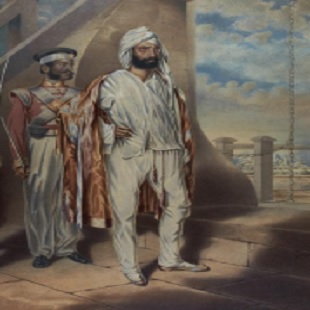
Mulraj, Diwan of Multan, was the son of Maharaja Ranjit Singh's brave general, Diwan Sawan Mal. Sawan Mal had achieved distinction by capturing Multan from the Afghans. Following Ranjit Singh's death in 1839, Lahore Darbar witnessed a series of conspiracies. This was one of the reasons for the Sikh defeat in the First Anglo-Sikh War in 1845. Following the war, the British restructured Punjab's administration. Sir Frederick Currie, the new British Resident in Lahore, raised taxes in Multan as one of his first acts. This decision sparked widespread resentment. Mulraj remained steadfastly loyal to Ranjit Singh and his family, and he resigned. Mulraj was to be replaced by Kahn Singh Mann. Kahn Singh arrived at Multan's gates on April 18, 1848, accompanied by Patrick Vans Agnew of the Bengal Civil Service and Lieutenant William Anderson of the Bombay Fusilier Regiment. A small escort of Gurkhas accompanied them. Mulraj was supposed to hand over the keys of the city to the two British officers the next day. On 19 April, a soldier from Mulraj's Sikh army attacked Vans Agnew as the two officers began to ride out of the citadel. Both officers were assassinated. The events in Multan gave the British a reason to fight the Second Anglo-Sikh War. Mulraj was portrayed as a bloodthirsty despot bent on deposing Duleep Singh and his British allies. By portraying Mulraj as an enemy of the Maharaja, British officials hoped that other influential Sikhs would refrain from joining his rebellion. Mulraj, on the other hand, was quickly reinforced by several other Khalsa regiments. Maharaj Singh, a Sikh saint, was instrumental in directing deserted Khalsa soldiers to Multan in support of Mulraj. The East India Company's Bengal Army, led by General Whish, laid siege to Multan. On January 2, 1849, Whish ordered a general assault. The attackers successfully scaled the breaches, and the battle in the city devolved into a bloody house-to-house fight in which many defenders and civilians were slaughtered indiscriminately. Mulraj surrendered with his men on January 22. The town was also heavily looted by the British. After the fall of Multan, Mulraj was put on trial for the murders of Vans Agnew and Anderson. He was sentenced to death, but he was later commuted to life in exile. He was supposed to be exiled to Singapore, but he was imprisoned at Fort William in Bengal due to dysentery. Later, he was to be transferred to Benares, but he died on the way on August 11, 1851, near Buxar jail. A handful of loyal servants cremated his body on the banks of the Ganga River. He was one of Lahore Darbar's loyal soldiers who fought against the British for the survival of the Kingdom of Punjab.